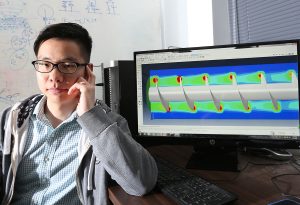
Purdue mechanical engineering doctoral student Yu Liu working on solving biorefinery blockage issues
Lignocellulosic biomass, often made up of materials such as corn stover and soybean hulls, often accumulates and compacts while moving through augers, forcing costly shutdowns for cleaning and repairs. The goal for the researchers is to transform solid biomass into a slurry that can act more like a liquid flowing freely through material transportation systems in biorefineries. To do that, the researchers will create models to predict the physical properties necessary for a liquid-like flow of solid materials, then develop methods for modifying the biomass to meet the models’ specifications, changing particle size, shape and charge.
Researchers will start with corn stover, which could be the foundation to develop similar technology for other biomass products, including wood chips, soybean hulls, wheat straw and sugarcane in the future. The funding, which will amount to $2.3 million total with cost share from partners, will cover three years.

